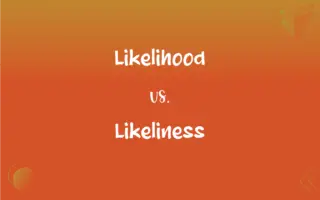Linux vs. Ubuntu: What's the Difference?
Edited by Aimie Carlson || By Harlon Moss || Published on January 27, 2024
Linux is a core operating system kernel, while Ubuntu is a complete operating system built around the Linux kernel.

Key Differences
Linux is the kernel, the core component of an operating system, managing hardware and basic processes. Ubuntu is a distribution (or 'distro') of Linux, providing a full-fledged operating system by adding software and tools to the Linux kernel.
The Linux kernel can be found in various operating systems, showcasing its versatility and adaptability. Ubuntu, specifically, tailors the Linux kernel for ease of use and accessibility, targeting both beginners and experienced users.
Linux itself does not come with a user interface, it forms the backbone for systems that do. Ubuntu includes a graphical user interface (GUI), making it user-friendly and visually appealing.
Linux offers a foundation for developers to build their own customized operating systems. Ubuntu stands as a popular example of this customization, providing a complete and ready-to-use Linux-based system.
In terms of community and support, Linux kernel development is vast and diverse, involving contributions from around the world. Ubuntu has its own dedicated community, contributing specifically to the Ubuntu ecosystem.
ADVERTISEMENT
Comparison Chart
Definition
Kernel at the core of an OS
Complete OS built around the Linux kernel
User Interface
No inherent UI
Includes a user-friendly GUI
Target Audience
Developers, tech-savvy users
General public, both beginners and experts
Customization
Used as a base for building OS
Comes as a fully functional, customized OS
Community
Broad, diverse development community
Dedicated Ubuntu community and support
ADVERTISEMENT
Linux and Ubuntu Definitions
Linux
Linux forms the foundation of various operating systems.
Many popular distributions, including Ubuntu, are based on the Linux kernel.
Ubuntu
Ubuntu is a Linux-based operating system for computers.
Ubuntu is favored by many for its user-friendly interface and robust performance.
Linux
Linux is known for its high degree of customizability.
Linux allows users to modify the system to meet their specific needs.
Ubuntu
Ubuntu includes a suite of pre-installed software.
Ubuntu comes with essential applications, making it ready for immediate use.
Linux
Linux is developed collaboratively by contributors worldwide.
The global Linux community continually enhances and updates the kernel.
Ubuntu
Ubuntu is designed for accessibility and ease of use.
Ubuntu's straightforward installation process makes it a popular choice for newcomers.
Linux
Linux is an open-source operating system kernel.
The Linux kernel is widely used in servers due to its stability and security.
Ubuntu
Ubuntu offers regular releases and updates.
Ubuntu's consistent updates ensure security and the latest software.
Linux
Linux supports a wide range of hardware platforms.
From personal computers to supercomputers, Linux runs on diverse hardware.
Ubuntu
Ubuntu is supported by Canonical Ltd. and a large community.
Canonical provides professional support for Ubuntu, supplementing community assistance.
Linux
(software) Any unix-like operating system that uses the Linux kernel.
Ubuntu
A philosophical doctrine or approach to life that emphasizes social unity and generosity of spirit.
Linux
An open-source version of the UNIX operating system
Ubuntu
(South Africa) A Nguni Bantu ideology focusing on people's allegiances and relations with each other.
FAQs
Can I use Linux directly without a distribution like Ubuntu?
Practically, no; Linux needs a distribution to be a usable operating system.
What is Ubuntu?
A complete operating system based on the Linux kernel.
Is Linux an operating system by itself?
No, Linux is the kernel, not a full OS; it needs additional components.
How does Ubuntu relate to Linux?
Ubuntu is one of many distributions that use the Linux kernel.
What are the advantages of Ubuntu over other Linux distributions?
Ubuntu is known for its user-friendliness, support, and regular updates.
Does Ubuntu have a desktop environment?
Yes, Ubuntu comes with a default desktop environment.
What is Linux?
A core operating system kernel used in various distributions.
How do I get support for Ubuntu?
Support is available through the Ubuntu community and paid services from Canonical.
Is Ubuntu free to use?
Yes, Ubuntu is free and open-source.
Can I customize Ubuntu?
Yes, Ubuntu is customizable, though Linux itself offers more flexibility.
Are Linux and Ubuntu secure?
Both are generally considered secure, with regular updates for vulnerabilities.
Do Linux and Ubuntu support gaming?
Yes, with improvements in Linux and Ubuntu, gaming is increasingly supported.
Do Linux and Ubuntu have a large user community?
Yes, both have extensive and active user communities.
What types of devices use Linux?
Linux runs on PCs, servers, smartphones, and embedded systems.
Are all Linux distributions similar to Ubuntu?
No, distributions vary in design, target audience, and features.
How often is Ubuntu updated?
Ubuntu has regular releases and frequent security updates.
Is Ubuntu suitable for programming and development?
Absolutely, Ubuntu is widely used for software development.
Can I contribute to Linux or Ubuntu development?
Yes, both are open-source and welcome contributions.
Can I run Windows applications on Ubuntu?
Through compatibility layers like Wine, some Windows applications can run on Ubuntu.
Is Linux used in enterprise environments?
Yes, Linux is widely used in servers and enterprise applications.
About Author
Written by
Harlon MossHarlon is a seasoned quality moderator and accomplished content writer for Difference Wiki. An alumnus of the prestigious University of California, he earned his degree in Computer Science. Leveraging his academic background, Harlon brings a meticulous and informed perspective to his work, ensuring content accuracy and excellence.
Edited by
Aimie CarlsonAimie Carlson, holding a master's degree in English literature, is a fervent English language enthusiast. She lends her writing talents to Difference Wiki, a prominent website that specializes in comparisons, offering readers insightful analyses that both captivate and inform.






































































